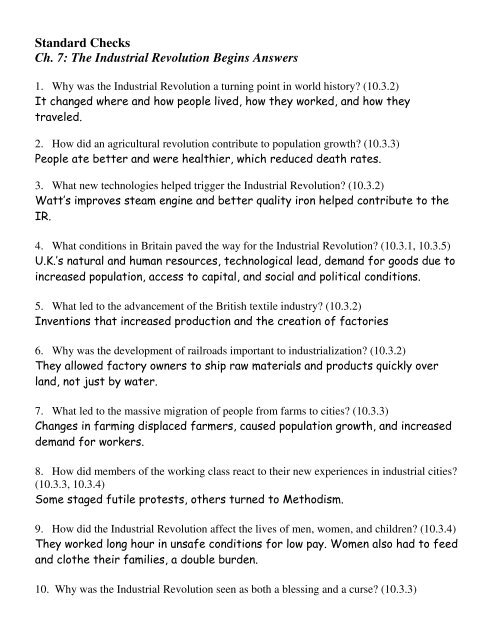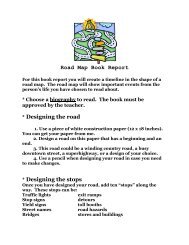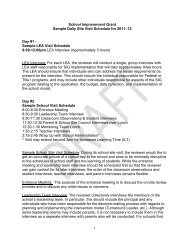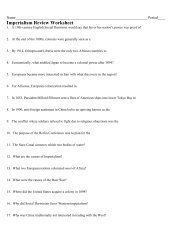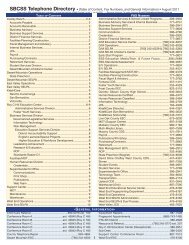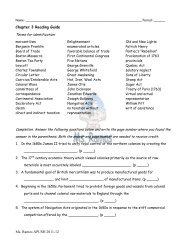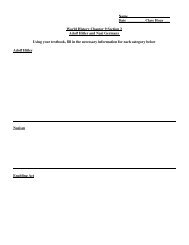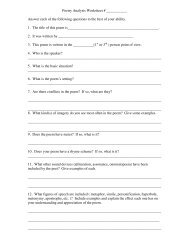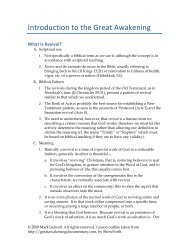Standard Checks Ch. 7: The Industrial Revolution Begins Answers
Standard Checks Ch. 7: The Industrial Revolution Begins Answers
Standard Checks Ch. 7: The Industrial Revolution Begins Answers
Create successful ePaper yourself
Turn your PDF publications into a flip-book with our unique Google optimized e-Paper software.
<strong>Standard</strong> <strong><strong>Ch</strong>ecks</strong><br />
<strong>Ch</strong>. 7: <strong>The</strong> <strong>Industrial</strong> <strong>Revolution</strong> <strong>Begins</strong> <strong>Answers</strong><br />
1. Why was the <strong>Industrial</strong> <strong>Revolution</strong> a turning point in world history (10.3.2)<br />
It changed where and how people lived, how they worked, and how they<br />
traveled.<br />
2. How did an agricultural revolution contribute to population growth (10.3.3)<br />
People ate better and were healthier, which reduced death rates.<br />
3. What new technologies helped trigger the <strong>Industrial</strong> <strong>Revolution</strong> (10.3.2)<br />
Watt’s improves steam engine and better quality iron helped contribute to the<br />
IR.<br />
4. What conditions in Britain paved the way for the <strong>Industrial</strong> <strong>Revolution</strong> (10.3.1, 10.3.5)<br />
U.K.’s natural and human resources, technological lead, demand for goods due to<br />
increased population, access to capital, and social and political conditions.<br />
5. What led to the advancement of the British textile industry (10.3.2)<br />
Inventions that increased production and the creation of factories<br />
6. Why was the development of railroads important to industrialization (10.3.2)<br />
<strong>The</strong>y allowed factory owners to ship raw materials and products quickly over<br />
land, not just by water.<br />
7. What led to the massive migration of people from farms to cities (10.3.3)<br />
<strong>Ch</strong>anges in farming displaced farmers, caused population growth, and increased<br />
demand for workers.<br />
8. How did members of the working class react to their new experiences in industrial cities<br />
(10.3.3, 10.3.4)<br />
Some staged futile protests, others turned to Methodism.<br />
9. How did the <strong>Industrial</strong> <strong>Revolution</strong> affect the lives of men, women, and children (10.3.4)<br />
<strong>The</strong>y worked long hour in unsafe conditions for low pay. Women also had to feed<br />
and clothe their families, a double burden.<br />
10. Why was the <strong>Industrial</strong> <strong>Revolution</strong> seen as both a blessing and a curse (10.3.3)
With reforms, it eventually brought the blessing of material benefits and new<br />
opportunities. However, at first workers lived and worked in wretched<br />
conditions and poverty.<br />
11. Explain the response to laissez-faire economics during the nineteenth century (10.3.6)<br />
Govt should not interfere in business b/c a free market eventually brings<br />
greater prosperity to everyone.<br />
12. What did John Stuart Mill see as the proper role of government (10.3.6)<br />
Mill believed govt should intervene to prevent harm to its citizens, such as<br />
abuse of workers.<br />
13. What did early socialist believe (10.3.6)<br />
That all property and all means of production should be owned by the people as<br />
a whole<br />
14. What did Marx predict was the future of the proletariat (10.3.6)<br />
<strong>The</strong> proletariat would overthrow capitalism through revolution, take control of<br />
the means of productions, and create a classless society.<br />
15. How accurate did Marx’s predictions about social classes prove to be (10.3.6)<br />
Marx was wrong about international revolution. By the 1990s, few communist<br />
countries remained.


